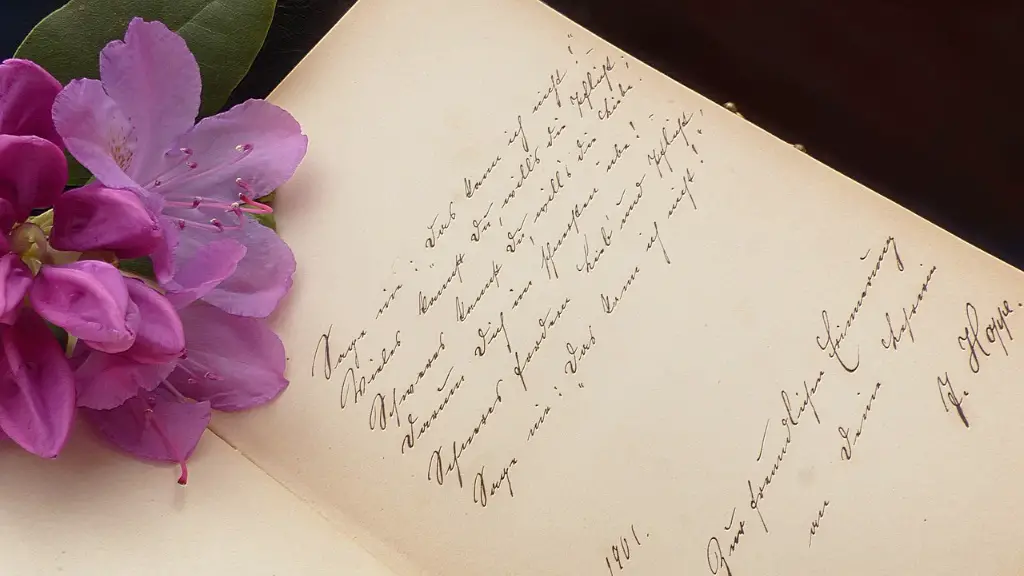Introduction
A book of poetry is a collection of poems written by a single author or a group of authors in one volume. It typically consists of short pieces in the form of lyrical prose, free verse, or standard rhythmic form. Poems are typically organized into sections that may represent themes or moods, such as love, war, heartache, and joy. Book of poetry can serve as great spiritual resources and therapeutic outlets for readers, as it conveys emotions and ideas in an accessible and intimate way.
Variety of Themes
Poets often write about a wide array of topics, and themes that are present in a book of poetry may range from the everyday to the extraordinary. Themes can include the deepest sorrows, heartbreaks, and the most ecstatic pleasures of the author’s life. Furthermore, the poems in a book of poetry may function as a way for an author to chronicle important events in their lives, such as a birth, a marriage, or a death.
Types of Poetry Books
When writing a book of poetry, authors often choose between two types of collections. The first type is a volume that contains poems that all deal with the same themes or same subject matter. The second type of poetry book is an anthology, which features poems from multiple authors, often from different time periods.
Uniquely Suited for Connecting with Others
Due to the concise, yet powerful nature of poetry, it has long been used as a form of communication. When a reader connects to the emotions and ideas of a poem, it can provide a sense of understanding, shared experiences, and closeness with the author. Book of poetry can also help readers who might not otherwise be able to put their emotions into words.
Written Form of Expression Throughout History
Since ancient times, poetry has been a way for writers to express their innermost thoughts and feelings, as well as to provide commentary on contemporary political and societal issues. From the Epic of Gilgamesh and the poems of Homer, to the verse of renowned authors like William Shakespeare, Emily Dickinson, and Sylvia Plath, poetry has endured as a uniquely powerful form of expression for thousands of years.
Passion and Creative License
One of the most appealing aspects of poetry is the passionate spirit and creative license that comes with writing and reciting it. Poetry has no rules or structure and authors often utilise poetic devices such as metaphor and metonymy to make their points in a vivid and memorable way.
Exerting Influence and Capturing Attention
Books of poetry have gained increasing popularity since the advent of social media. Poetry can be used as a political or social statement, or as a vehicle to capture attention and conveying a message. Famous poets of recent times such as Rupi Kaur and Amanda Gorman have gained international acclaim by exerting influence through their books of poetry.
A Source of Artistic Joy and Insight
Whether it is an expansive work filled with diverse subject matter or a single author’s moving and emotive thoughts, a book of poetry is a source of artistic joy as well as a profound insight into the authors’ thoughts and feelings. Genuine emotion and reflection is usually apparent in reading a book of poetry, and readers often find comfort or inspiration from the words and motivations of the authors.
Using Poetry as Therapeutic Outlet
For many readers and poets, book of poetry is a way to cope with difficult emotions and understand one’s own internal landscape. There is something about storytelling in a poetic form that allows for a transformative experience. By working through difficult emotional states through the poetic form, writers can explore and uncover deeply held thoughts and issues that may have been previously inaccessible.
Aesthetic Value
In addition to its emotional impact, books of poetry can be intensely visually pleasing due to its often minimalist aesthetic. Through their visual representations, poets are able to create moods and express ideas with few words, making them highly appealing to many readers. The cover art, illustrations and page design of books of poetry can also lend it an additional visual interest.
Modern Adaptations of Classic Poetry
In recent years, there has been a rebirth of appreciation for poetry, as modern adaptations of classic works have been produced in various mediums. Music videos, films, books, and podcasts have all been used to portray different interpretations of classic poems. As such, poetry has been gaining even more popularity, as authors, curators, and performers have worked to ensure poetry remains accessible to the masses.
Poetry Reading Groups
Poetry reading groups are becoming increasingly popular in many countries around the world. These groups bring together people from diverse backgrounds to discuss, analyse and enjoy poetry. Poetry readings have grown to include multiple genres, such as hip-hop, rap and spoken word. Moreover, online groups have been created to facilitate discussion and appreciation of poetry, and are a welcomed addition to the already vibrant and engaged poetry community.
Celebration of Language
At its core, book of poetry is a celebration of language. Poetry, much like art, conveys a creative vision in a way that only words can, and this allows readers to connect with a deeply personal and meaningful experience. As such, it’s no surprise that books of poetry have and will continue to remain as a lasting source of joy and inspiration.



